Neurologic Physical Therapy Residency
Mary Free Bed has partnered with Grand Valley State University to provide an exemplary training opportunity for neurologic physical therapy. Residents build clinical reasoning skills enhanced through clinical mentoring time with an expert neurologic therapist.
The mission of our Neurologic Physical Therapy Residency is to provide advanced clinical training in an integrated environment of professional mentorship, clinical excellence, research and education. Residents will:
- Develop advanced knowledge, skills and clinical expertise in neurology physical therapy, preparing them for advanced specialty practice and to become leaders in their profession.
- Work collaboratively with the interdisciplinary team to assist in restoring hope and freedom to patients with diverse neurologic conditions.
- Contribute to and effectively implement evidence-based clinical practice and will share their knowledge and expertise with students, fellow clinicians and the patients and families they serve, while exhibiting high ethical standards and professionalism.
 The Mary Free Bed Rehabilitation Hospital and Grand Valley State University Neurologic Residency is accredited by the American Physical Therapy Association as a post-professional residency program for physical therapists in neurologic clinical practice.
The Mary Free Bed Rehabilitation Hospital and Grand Valley State University Neurologic Residency is accredited by the American Physical Therapy Association as a post-professional residency program for physical therapists in neurologic clinical practice.
Learn more
Please explore the categories below for program details.
Check out our Frequently Asked Questions Document here.
Application questions: Email recruitment@maryfreebed.com.
Program-specific questions: Email PTneuroresidency@maryfreebed.com.
General residency/fellowship questions: Email Therapy.ResFel@maryfreebed.com.
Clinical Curriculum
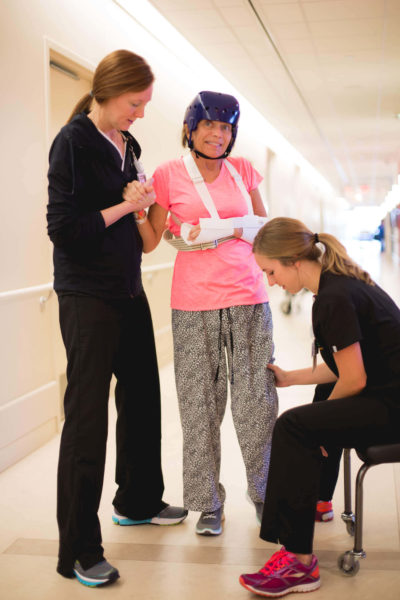 The curriculum will be based on the most recent Description of Specialty Practice in Neurologic Physical Therapy from the American Physical Therapy Association. Clinical time will be split between our 167-bed rehabilitation hospital and Outpatient Therapy Center. Inpatient clinical rotations will be with the brain injury, spinal cord injury and stroke teams. The resident also will have an outpatient rotation working across neurologic diagnosis with a focus primarily in vestibular and post-concussion patients. While in each specialty area, the resident will build clinical reasoning skills enhanced through clinical mentoring time with an expert neurologic therapist.
The curriculum will be based on the most recent Description of Specialty Practice in Neurologic Physical Therapy from the American Physical Therapy Association. Clinical time will be split between our 167-bed rehabilitation hospital and Outpatient Therapy Center. Inpatient clinical rotations will be with the brain injury, spinal cord injury and stroke teams. The resident also will have an outpatient rotation working across neurologic diagnosis with a focus primarily in vestibular and post-concussion patients. While in each specialty area, the resident will build clinical reasoning skills enhanced through clinical mentoring time with an expert neurologic therapist.
Mary Free Bed and Grand Valley State University also have established relationships with local organizations to provide clinical learning experiences in pediatric outpatient settings, inpatient acute care and transitional living center.
Supplemental professional development activities include clinical observation in multiple specialty clinics (Post-Concussion, Muscular Dystrophy, ALS) and observation of many specialty rehabilitation services, including OrthoSEAT, adaptive technology, Orthotics & Prosthetics + Bionics, videofluroscopy swallowing study and the Motion Analysis Laboratory.
The resident also will lead monthly journal clubs to engage the rehabilitation team in evidence-based practice and case reviews to explore clinical decision-making and application of research into a current clinical case.
Didactics
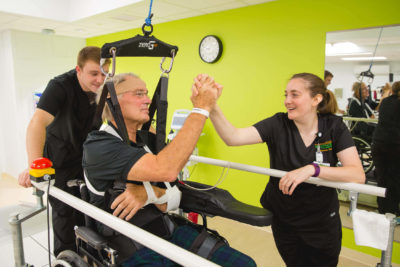 The curriculum will be based on the most recent Description of Specialty Practice in Neurologic Physical Therapy from the American Physical Therapy Association. Didactic information will be presented to the resident in a variety of formats — webinars, self-guided modules, directed readings, hands-on practice, discussion with mentors and more — to impart specialty-specific knowledge. Residents will be supported in continuing education opportunities and required to share information learned with the team.
The curriculum will be based on the most recent Description of Specialty Practice in Neurologic Physical Therapy from the American Physical Therapy Association. Didactic information will be presented to the resident in a variety of formats — webinars, self-guided modules, directed readings, hands-on practice, discussion with mentors and more — to impart specialty-specific knowledge. Residents will be supported in continuing education opportunities and required to share information learned with the team.
Dedicated time also will be spent engaging in a scientific inquiry project with a Grand Valley State University faculty mentor and collaborator focused on an area of the resident’s interest.
Residents will have the opportunity to gain teaching experience working in GVSU Department of Physical Therapy’s neurologic lab and classroom settings. Additionally, the resident will spend time overseeing GVSU DPT students in their pro bono clinic, serving a portion of the uninsured and underinsured Grand Rapids population.
Faculty
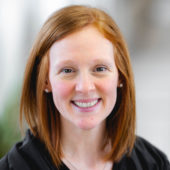 Christina Platko, PT, DPT, NCS
Christina Platko, PT, DPT, NCS
Program director, Brain Injury Team mentor
• Board-certified clinical specialist in neurologic physical therapy
• Certified Brain Injury Specialist
• DPT, Grand Valley State University; BS Sports Medicine/Athletic Training, Central Michigan University
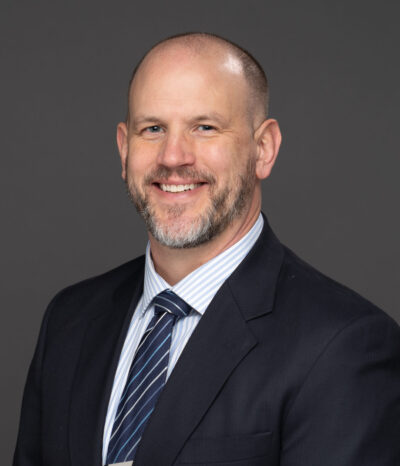
Andy Wicks, PT, DPT
Assistant program director, Grand Valley State University faculty/research mentor
• Board-certified clinical specialist in neurologic physical therapy
• DPT, University of Minnesota-Minneapolis; BS in Physical Education and Sports Science, St. Olaf College
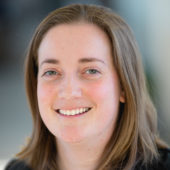 Sarah Battjes PT, DPT
Sarah Battjes PT, DPT
Stroke/Amputee Team mentor (inpatient)
• Board-certified clinical specialist in neurologic physical therapy
• DPT, Central Michigan University; BS Health Fitness and Rehabilitation
 Michelle Terrell MS PT, MS
Michelle Terrell MS PT, MS
Outpatient mentor
• Focus areas: Post-concussion, vestibular, brain injury, balance disorders
• MS PT, Grand Valley State University
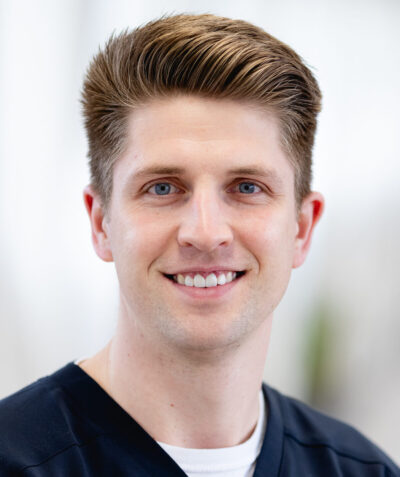
Michael Hankinson
Outpatient mentor
• Board-certified clinical specialist in neurologic physical therapy
• Certified Stroke Rehabilitation Specialist
• Focus areas: vestibular, general neuro, SCI
• DPT, Trine University; BA Exercise Science Hope College
 Jessica Larson, PT, DPT
Jessica Larson, PT, DPT
Spinal Cord Injury Team mentor (inpatient)
• DPT Central Michigan University, BS Health Fitness and Rehabilitation
Job Details
The resident will have full-time status as a Mary Free Bed employee, which includes full-time benefits. The resident also will be appointed part-time faculty at Grand Valley State University, which includes access to university resources.
Fees: $700 for curriculum.
Eligibility
The applicant must be a physical therapist or in his or her final year of an accredited physical therapy program. Applicants must have obtained State of Michigan licensure prior to beginning the residency. Residents must be a member of the APTA.
Want to apply?
Applications will open October 2025 for the 2026-2027 residency year.
Please submit your application through the RF-PTCAS system. Click here to begin the process.
If you have further questions, email recruitment@maryfreebed.com.
For program-specific questions, email PTneuroresidency@maryfreebed.com.
Download the Mary Free Bed Rehabilitation Hospital and Grand Valley State University Neurologic Residency Program Financial Fact Sheet.
Outcomes
Programmatic Goals
Goal 1: Graduate residents with post-professional experiential learning in neurologic physical therapy who can integrate advanced patient-centered clinical practice and interdisciplinary team-based collaborative practice with a theoretical knowledge base in rehabilitation science.
Goal 2: Develop advanced trained clinicians who will provide high quality, ethical, evidence-based clinical services to the community.
Goal 3: Empower physical therapists to practice ethical, clinical decision-making and demonstrate professionalism and virtuous behavior.
Goal 4: Provide physical therapists who value and contribute to the profession of physical therapy and the health care community through evidence-based practice, teaching and advancing the body of knowledge in neurologic physical therapy.
Goal 5: Maintain a high-caliber residency program and ABPTRFE accreditation as a neurologic residency program.
Goal 6: Develop knowledge, skills and attributes to prepare physical therapy residents to attain Neurologic Clinical Specialist Certification.
These goals are assessed using 15 key indicators.
Program Outcomes
• Resident will display competence in advanced patient-centered clinical practice and the foundational knowledge for neurologic clinical practice consistent with the knowledge areas and client/patient management areas of the Description of Residency Practice – Neurology.
• Resident will become an advanced trained clinician who will provide high-quality evidence-based clinical services to the community, incorporating appropriate best-practice strategies, new techniques and applied knowledge into neurologic physical therapy practice.
• Resident will develop proficient skills in scientific inquiry to guide clinical practice and contribute to the growing body of evidence in neurologic physical therapy.
• Resident will demonstrate ability to effectively teach and mentor others (students, peers, other health care professionals) in neurologic physical therapy.
• Resident will exhibit high standards of ethical, clinical decision-making, virtuous behavior and professionalism.
• Resident will meet qualifications/eligibility for and be prepared to sit for ABPTS Neurologic Clinical Specialist board examination.
These outcomes are assessed using 33 key indicators.
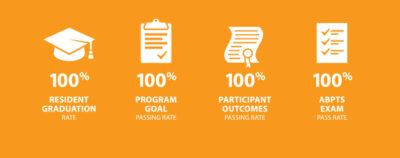
Research
Each year, the resident presents his or her findings at Mary Free Bed Rehabilitation Hospital’s Interdisciplinary Grand Rounds. Most residents also present their findings at a national level as either a poster or platform presentation. Listed below are citations for the residents’ presentations and links to the published works.
Kelch A, Harro C. Physical Therapy Interventions in a Patient with Nontraumatic Incomplete Spinal Cord Injury Secondary to Metastatic Lung Cancer: A Case Report. Physiotherapy Theory and Practice, 2022: 38 (12): https://www.tandfonline.com/eprint/JS24DAAHXTAHC9HVQDNC/full?target=10.1080/09593985.2021.1923094
Evans J, Harro CC. High Intensity Gait Training for Patient With Apraxia Following Ischemic and Hemorrhagic Stroke. Research poster presentation at American Congress of Rehabilitation Medicine Annual Conference, Chicago, IL, Nov 8-11, 2022
Cherven A, Harro CC. Physical Therapy Interventions in a Patient with Traumatic Brain Injury and Severe Contraversive Pushing: A Case Report. Research platform presented at Michigan Physical Therapy Association Annual Fall Conference, Oct 2020. Research poster presentation at Annual Academy of Neurologic Physical Therapy Annual Conference, October 2021.
Kuster R, Harro CC. Clinical Decision-making for Locomotor Training in a Patient with C4-Brown Séquard Syndrome: A Case Report. American Congress of Rehabilitation Medicine: 97th Annual Conference, Atlanta GA (virtual); Oct 14-17, 2020
Kelch A, Harro CC. Physical Therapy Interventions in a Patient with Incomplete SCI and Metastatic Cancer: A Case Report. Research poster presentation at American Congress of Rehabilitation Medicine Annual Conference, Chicago, IL, Nov 5-8, 2019
Harro CC, Kaiser MR, Maurer PM. Ankle foot orthotic prescription and gait outcomes in patients with stroke or brain injury in inpatient rehabilitation. Research poster accepted for the American Physical Therapy Association NEXT conference, June 2018.
Maurer PM, Harro CC, Kaiser MR. Clinical Decision-Making Regarding Ankle Foot Orthotic Prescription in Patients with Stroke or Brain Injury during Inpatient Rehabilitation. Research poster accepted for American Physical Therapy Association NEXT conference, June 2018.
Ayotte S, Harro CC. Effects of an Individualized Aerobic Exercise Program in Individuals with a Brain Tumor Undergoing Inpatient Rehabilitation: A Feasibility Study. Rehabil Oncol 2017: 35(4) 163-171. http://journals.lww.com/rehabonc/Abstract/2017/10000/Effects_of_an_Individualized_Aerobic_Exercise.3.aspx
Hudson K, Harro C, Ayotte S. Effects of an Individualized Aerobic Exercise Program in Individuals with a Brain Tumor Undergoing Inpatient Rehabilitation: A Feasibility Study. Arch Phys Med Rehabil. 2016;97: e28. {Published Abstract} Research Poster presented at the American Congress of Rehab Medicine (ACRM) Annual Conference. Chicago IL, 2017.
Engelsma J, Gamble A, Harro CC, Farris J: PocketPT – A Personalized Therapeutic Game Platform; Journal of Computer Games and Multimedia. 2014; 3 (4): 55-62
Harro CC, Gamble A: Application of an Innovative and Interactive Gaming System in Individualized Therapeutic Intervention: A Case Series. Platform presented at Michigan Physical Therapy Association Annual Fall Conference, Oct. 11-12, 2013
Gorman SL, Harro C, Platko C. Validity and responsiveness of the Function in Sitting Test (FIST) in adults in inpatient rehabilitation: A preliminary analysis. J Rehab Med 2013; 6 (Suppl 53): 99
Gorman SL, Harro C, Platko C. Validity and responsiveness of the Function in Sitting Test (FIST) in adults in inpatient rehabilitation: A preliminary analysis. Research platform presented at 7th World Congress of the International Society of Physical and Rehabilitation Medicine (ISPRM2013), Beijing, China, June 16-20, 2013
Gorman S, Harro CC; Platko C. Function in Sitting Test Admission Score Predicts Inpatient Rehabilitation Discharge Destination. Research poster presentation APTA Academy of Neurology and Academy of Pediatric Physical Therapy; IV Step Conference 2016: Prevention, Prediction, Plasticity, and Participation. Columbus OH, July 16, 2016
Gorman SL, Harro CC, Platko C, Greenwald C. Examining the Function in Sitting Test for Validity, Responsiveness, and Minimal Clinically Important Difference in Inpatient Rehabilitation. Arch Phys Med Rehabil 2014; 95: 2304-2011 http://www.archives-pmr.org/article/S0003-9993(14)00965-4/abstract
Harro CC, Chapin M, Bontregar K, Campbell SC. Effects of Botulinum Toxin injections into the Rectus Femoris muscle on gait function in stiff knee gait following brain injury or stroke. JNPT 2014; 39 (1): 75. {Published Abstract} Research Poster presented at American Physical Therapy Association Combined Sections Meeting, Las Vegas, NV, Feb 3-6, 2014
Jenkins L, Harro CC, O’Conner E: Evaluation of Outcomes of Vestibular-Related Dysfunction in Mild Traumatic Brain Injury. Research Poster presented at Physical Therapy 2008: Annual Conference & Exposition of the American Physical Therapy Association; San Antonio, June 11-14, 2008
Harro CC, Jenkins L, O’Conner E: Examination of Vestibular-Related Dysfunction in Mild Traumatic Brain Injury. Research Poster presented at Physical Therapy 2008: Annual Conference & Exposition of the American Physical Therapy Association; San Antonio, June 11-14, 2008
Hammond S, Harro CC: Vestibular Evaluation in Individuals with Mild Brain Injury. J Neurol Phys Ther 2006;29(4):209. {Published abstract} Research Poster presented at Combined Sections Meeting of the American Physical Therapy Association, San Diego CA, 2/2006.
Simon T, Harro CC: Reliability and Validity of the Dynamic Gait Index in Individuals with Brain Injury. Research Poster presented Michigan Physical Therapy Association Annual Fall Conference, Oct 10-11, 2008, Frankenmuth, MI
Simon T, Harro CC: Reliability and Validity of the Dynamic Gait Index in Individuals with Traumatic Brain Injury. J Neurol Phys Ther 2005; 28 (3), 180. {Published abstract} Research poster presentation at Combined Sections Meeting of the American Physical Therapy Association, New Orleans, 2/2005
Vanderheide M, Harro CC. Center of Mass Motion During Walking in Moderate and Severe Traumatic Brain Injury. J Neurol Phys Ther 2003;27(4): 184. {Published abstract}. Research platform presentation at Combined Sections Meeting of the APTA, Nashville, TN 2004.


